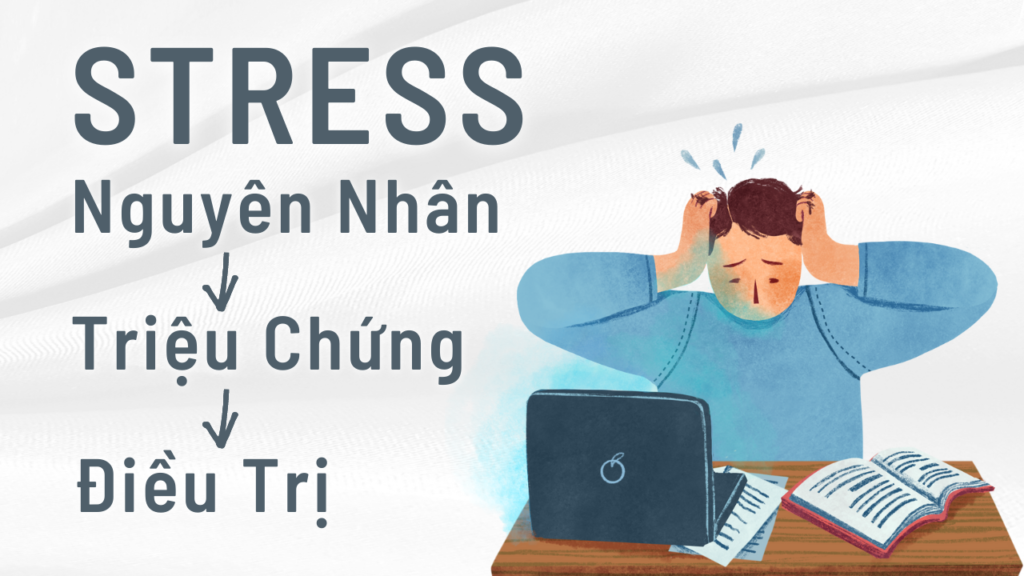Stress is a condition that many people face today, whether teenagers or working people and even the elderly can experience stress. So what is stress, signs, causes and how to treat it? Follow along with this article to get a better overview!
What is stress?
Stress is a normal human response that happens to everyone. In fact, the human body is designed to experience stress and respond to it. When you experience changes or challenges (stressors), your body produces physical and emotional responses – that is stress.
The stress response helps your body adapt to new situations. Stress can be positive, keeping us alert, motivated, and ready to avoid danger. For example, if you have an important test coming up, the stress response can help your body work harder and stay awake longer.
But in this article we are going to discuss how stress becomes a problem when stressors continue without abatement or without time to relax, it causes your mental breakdown and becomes worse. negative.
Symptoms of Stress
Physical symptoms of stress (stress) include:
- Body aches and pains.
- Chest pain or feeling like your heart is beating very fast and uncomfortable.
- Exhausted or difficulty sleeping.
- Headache, dizziness or tremors.
- High Blood Pressure.
- Stomach or digestive problems.
- Trouble having sex.
- Weak immune system.
Stress can lead to emotional and mental symptoms such as:
- Anxiety or irritability.
- Depression.
- Sad and melancholy.
- Negative reactions to everything around.
Causes of stress
In general, causes of work stress include:
- Unhappy, satisfied at work.
- Have a heavy workload or high responsibilities.
- Work many hours.
- Poor management, unclear expectations about your work, or no say in the decision-making process.
- Working in hazardous conditions.
- Uncertainty about promotion opportunities or the risk of contract termination.
- Must speak in front of colleagues.
- Face discrimination or harassment in the workplace, especially if your company doesn't support it.
Life stress can also have a big impact. Examples of life stressors are:
- The death of a loved one.
- Divorce.
- Job loss.
- Increased financial obligations.
- Get married.
- Move to a new house.
- Chronic illness or injury.
- Emotional problems (depression, anxiety, anger, grief, guilt, low self-esteem).
- Caring for an elderly or sick family member
- Traumatic event, such as natural disaster, theft, rape, or violence against you or a loved one.
Sometimes stress comes from within, not without. You can stress yourself out just by worrying about things. All of these factors can lead to stress. Your stress level will vary based on your personality and how you react to situations.
Some ways to reduce stress (stress)
You can't avoid stress, but you can prevent it from becoming overwhelming by practicing a few strategies on a daily basis:
- Exercise when you feel the symptoms of stress appear. Even a short walk can improve your mood.
- Participate in sports such as badminton, yoga, gym, football ... to improve health and spirit.
- At the end of each day, take a moment to think about what you've accomplished, not what you haven't.
- Set goals for your day, week, and month. Narrowing your horizons will help you feel more in control of your current and long-term tasks.
- Consider talking to a therapist or healthcare provider about your concerns.
3 effective yoga poses to reduce stress at home
1. Sphinx Yoga Pose

Guide:
- Lie face down on two pillows.
- Stand on your forearms (or cross your arms on two pillows).
- Lie down in a comfortable position.
2. Frog Yoga Pose

Guide:
- Extend your knees to the sides (knees and hips even).
- Lower yourself onto two relaxed pillows, breathing evenly for 5 breaths.
3. Butterfly Yoga Pose

Guide:
- Lean back, lower your head on two pillows.
- Knit the soles of the feet together.
- Lie down and relax.
Nguyen hopes that the above sharing will be effective and helpful for your stress. Please follow and wait with Nguyen the posts about health and next Yoga!
References
https://www.mind.org.uk/information-support/types-of-mental-health-problems/stress/signs-and-symptoms-of-stress/
https://my.clevelandclinic.org/health/articles/11874-stress



